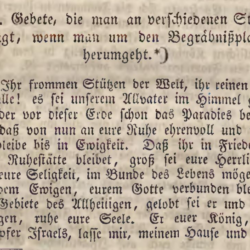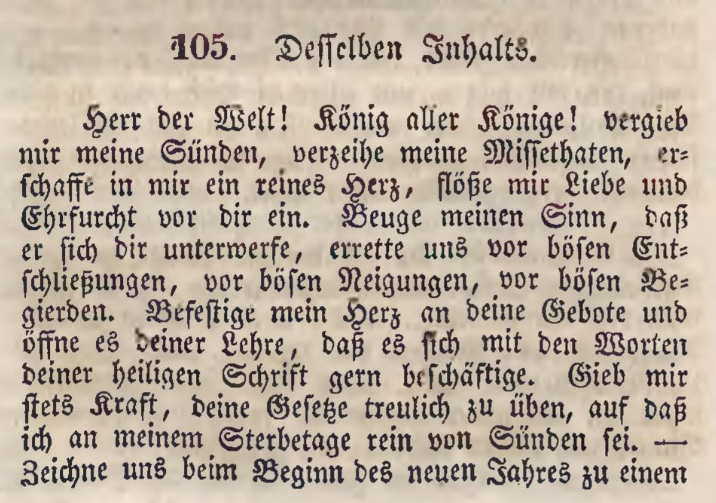| Source (German) | Translation (English) |
|---|---|
Wenn man vom Begräbnißplatz geht. |
When you leave the burial place. |
Ruhet in Frieden, ihr reinen Seelen, entsprungen vom Glanze dessen, der das Licht erschaffen hat. Indem ich von hinnen gehe, preiset meine Seele Gott. Ich flehe den Ewiglebenden, daß er mir Seele und Geist erhalte. Er vermehre Ehre und Ruhm, derer, die nach Vollkommenheit streben; den Bescheidenen lasse er das Streben nach Tugend gelingen; den Heiligen, die seinen Willen zu thun streben, gewähre er die Freude, zu sehen wie ihre Kinder Gottes Gebote beobachten. Er verlängere ihr Leben, daß sie ihres Volkes Erlösung schauen. So ruht denn, ihr Redlichen, ruhet, bis der ewiglebende Gott, der Herr des Himmels und der Erde euch zuruft: Erhebt euch, ihr Redlichen, erhebt euch zur Auferstehung! — Wir mögen erhalten werden zu einem glückseligen Leben, bis der zuverläßige Gesandte, der Erlöser vom Gott Jakobs kommt, um die Herzen der Eltern den Kindern, und das Herz der Kinder den Eltern zuzukehren ohne Trug. Unsre Tugend gehe vor uns her, und aus allen Kräften wollen wir den allmächtigen, wundervollen Gott preisen, der durch sein Wort die Todten belebt. Er thut unerforschlich große Dinge, Wunder ohne Zahl. Gepriesen sei der, der die Todten belebt. |
Rest in peace, you pure souls, sprung from the splendor of Him who created the light. As I pass away, my soul praises God. I beseech the Eternal Living One to preserve my soul and spirit. May he increase the honor and glory of those who strive for perfection; may he make the humble succeed in the pursuit of virtue; may he grant the saints who strive to do his will the joy of seeing their children observe God’s commandments. He prolongs their lives so that they may see the salvation of their people. Rest then, ye righteous, rest until the ever-living God, the Lord of heaven and earth, shall call unto you: Arise, ye righteous, arise unto the resurrection! — We may be preserved to a blissful life until the reliable messenger, the redeemer from the God of Jacob comes to turn the hearts of parents to children, and the hearts of children to parents without deceit. Let our virtue go before us, and with all our might let us praise the almighty, wonderful God, who by his word revives the dead. He does inscrutably great things, wonders without number. Praise be to him who revives the dead. |
“Wenn man vom Begräbnißplatz geht” was translated/adapted by Yehoshua Heshil Miro and published in his anthology of teḥinot, בית יעקב (Beit Yaaqov) Allgemeines Gebetbuch für gebildete Frauen mosaischer Religion. It first appears in the 1835 edition as teḥinah №132 on pp. 248-249.
We welcome corrections and improvements. The transcription of the German from Latin script in Fraktur type provided machine-readable text for a machine translation by DeepL, which we then edited for accuracy and clarity. –Aharon Varady
Source(s)


“Wenn man vom Begräbnißplatz geht | When you leave the burial place, a teḥinah by Yehoshua Heshil Miro (1835)” is shared through the Open Siddur Project with a Creative Commons Attribution-ShareAlike 4.0 International copyleft license.










Leave a Reply